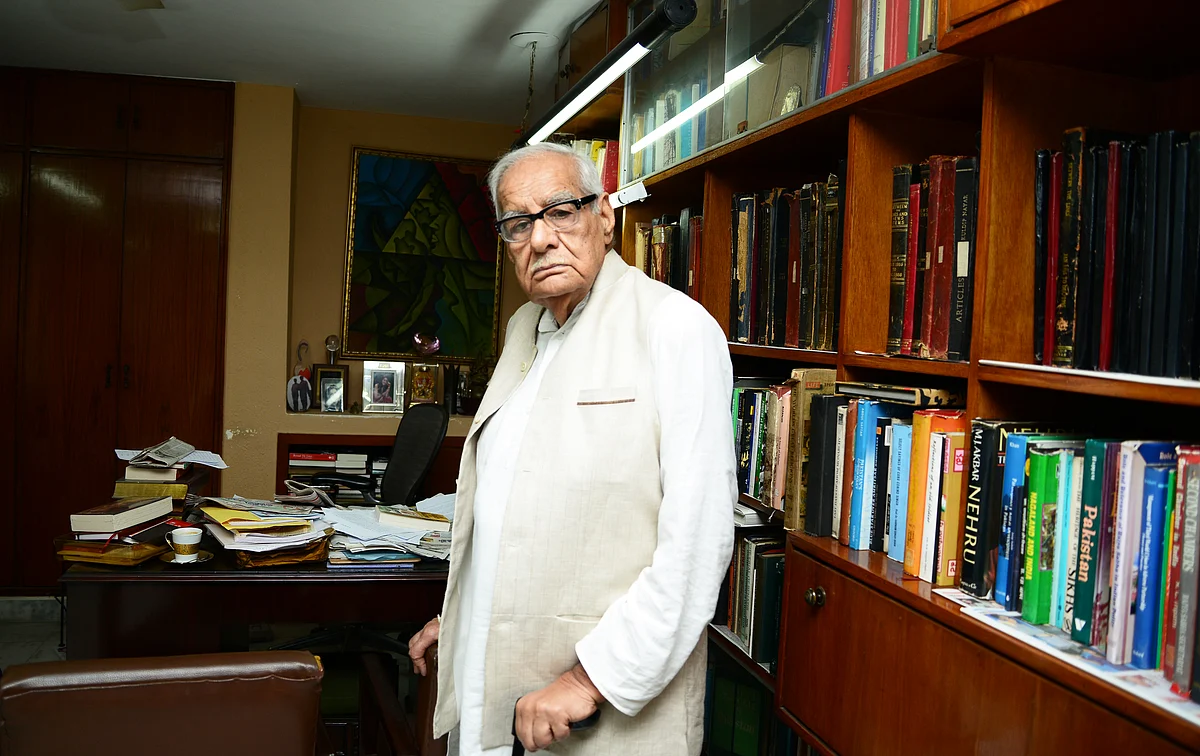Kuldip Nayar’s final journey across the Wagah border
The ashes of veteran journalist and human rights activist, Kuldip Nayar, were immersed in the river Ravi in Lahore by his granddaughter Mandira Nayar and her husband, Ratish Nanda on October 6

Both in his life and death, veteran journalist Kuldip Nayar straddled both sides of the India-Pakistan border. He was one of the last of the journalists who began their careers just after the partition of the sub-continent. Nayar is perhaps the only journalist, in the recent past, whose ashes traveled across the border to be immersed in a Pakistani river—this was his last wish.
He worked all his life to improve relations between the two countries, and established the vigil that is still held on the Wagah-Attari border near Amritsar at midnight on August 14/15 and it was his birthday too.
The mortal remains of the veteran journalist travelled the same road across the border at Wagah. Kuldip Nayar’s grand-daughter Mandira and her husband, conservation architect, Ratish Nanda, undertook the journey this month to fulfill the last wish of their grandfather.
After having immersed a part of his ashes in the Ravi river on October 6, they returned home carrying with them overwhelming memories of Kuldip Nayar’s last journey and a deep sense of gratitude.
Though Mandira and Ratish could not visit Sialkot, a lot of people from his native town came to Lahore to meet them in person and participate in the last rites.
Before their visit, Kuldip’s ashes were taken to Pakistan by a group of Pakistani peace activists including former senior Judge Nasir Aslam Zahid, executive director of Pakistan Institute of Labour Education and Research, Karamat Ali, and advocates Haya Eman Zahid and Altaf Khoso. They were in India to attend a roundtable conference in New Delhi on August 31 on Pakistani and Indian prisoners jailed in both countries.
“He (Nayar) was associated with a lot of human rights movements and missions in Pakistan, and shared a very cordial relationship with academicians, political leaders, human rights activists and artists there,” said members of his family.
Describing him as someone “optimistic about a hopeful world till his last breath”, a family friend and actor-director Nandita Das in her tribute remembered Nayar as an apostle of peace between the two countries. “I regret he won’t see Manto (her film on the great Urdu writer), as he so wanted to. He played a big part in my engagement with issues of peace and violence. May he rest in peace after a life fully lived.”
Days after he celebrated his 95th birthday on August 14, Nayar passed away on August 23, due to cardiac arrest at the Escorts Hospital, New Delhi. He was born in Sialkot and studied at Forman Christian College, then the Law College in Lahore obtaining a law degree. When violence broke out during Partition in 1947, the family migrated to India. Part of his ashes were also immersed in the Ganga near Hapur and Ravi on the Pakistan side of the Wagah border.

His family points out that the veteran journalist may not have been a member of the Delhi Press Club but had a membership in the Lahore Press Club. In fact, the latter bestowed Mandira with an honorary membership during her two-day visit. It’s president, Azam Chaudhry, described “Kuldip Sahab” as a champion of South Asian solidarity in his keynote address, remembering how he was equally loved and respected in Pakistan as he was in other countries in the region. Others remembered Nayar’s visits to Pakistan. They fondly told Mandira and her husband that wherever “Kuldip Sahab” would go, the place would acquire the atmosphere of a ‘mela’ or ‘jalsa’.
“If there is no people-to-people contact, no cultural exchanges and confidence building measures, then people in Pakistan will only know what people like Arnab Goswami tell them about India,” said family members.
The Nayar family recalls what former federal minister and a Lahore based lawyer, Aitzaz Ahsan, said at a tribute function held in Lahore: “He (Nayar) believed in the power of people. In Lahore, people shared their account how he engaged with people from different political backgrounds with equal ease. He firmly believed in the people’s right to change.”
As reported in the Pakistan media, before the mortal remains were immersed, a function was held at Government College Lahore where Mandira and her husband planted a sapling in remembrance of Kuldip Nayar and his friend, the late Justice Rajindar Sachar, who was an alumnus of the college.
Follow us on: Facebook, Twitter, Google News, Instagram
Join our official telegram channel (@nationalherald) and stay updated with the latest headlines
